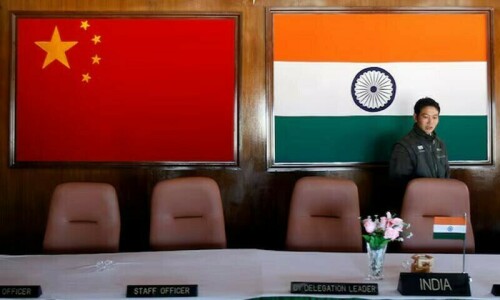By all means, this is perhaps one of the steepest fiscal adjustments that Pakistan has ever agreed to undertake in its history.
Recovering from the negative economic performance, first time after 1952, the impact would just not be less than a triple jeopardy – additional tax burden, lower spending on improving living standards, and paying out of pocket for the same utilities and yet no near-future signs of let-up.
Prime Minister Imran Khan’s government has committed to increasing Federal Board of Revenue (FBR) tax collection by about Rs1.27 trillion (around 2.5 per cent of GDP), including Rs750 billion worth of additional tax measures in the upcoming budget.
This is on top of about Rs280bn cuts on the development budget, including Rs150bn in federal Public Sector Development Programme (PSDP) during the current fiscal year and almost a freeze on development and defence expenditures as a percentage of GDP over the next five years. A third part and perhaps the most painful of all is the gradual increase in electricity costs to generate almost Rs900bn (close to 2pc of GDP) in less than a year. The gas price adjustments would be yet another add-on.
The IMF now requires parliament to approve laws under deadlines unlike the previous programmes that conceded the legislature could not be given dictations
The implementation of such a challenging task has its own risks when the national economy is recovering from 0.4pc contraction, involving job losses, salary cuts and increasing poverty. The World Bank estimates that the last one-and-a-half years had reversed the last 20-year gains on poverty reduction, although there is no clear data to support this at this stage.
“Unfortunately, there are no easy solutions and hard choices have to be made in the power sector,” said Ernesto Rigo, International Monetary Fund (IMF) mission chief to Pakistan, when asked if it was realistic to have such kind of operations when the economy and people are trying to survive tough economic times. “Otherwise, it would remain a drag on economic growth.”
But Prime Minister Khan and his new finance minister Hammad Azhar have already started talking about renegotiating with the IMF in view of the severe third wave of Covid-19 after getting the first $500 million tranche under the revived programme. Interestingly, the monitoring requirements and sequencing have also been toughened under the programme that was revived with five prior actions, 10 revised benchmarks or deadlines and 11 totally new structural benchmarks.
Mr Rigo, however, believes that programme objectives and its design could not be changed although sequencing could always be reviewed in the light of changing economic conditions. The IMF has issued its growth forecast at 1.5pc for the current year against 3pc anticipated by the State Bank of Pakistan (SBP), improving to 4pc of GDP next year and then staying flat at 5pc until 2026. Growth is expected to gradually improve, but only reach its medium-term potential of 5pc in 2023-24, later than envisioned in the first EFF review, due to the large shock and the need for continued fiscal adjustment, which is expected to offset some of the impact of the stronger private-sector growth on the overall economy.
Yet, the reviews would now take place on a quarterly basis for close monitoring by the IMF staff instead of biannual reviews under the original programme that remained virtually suspended for a year. On top of that, for the first time there are conditions in the programme that require parliament to approve measures and laws under deadlines. In previous programmes, the IMF staff used to engage with parliamentarians for exchange of views and advocacy but had always conceded that parliament could not be given dictations.
The IMF puts on record that authorities have committed to 3.3pc of GDP worth of revenue measures over the programme period ending in September 2022 and based on agreed fiscal measures for the next year’s budget notes a virtual freeze on defence and development spending in terms of GDP percentage not only next year but also over the next five years.
The Fund forecasts the current account deficit to widen to 1.5pc of GDP in 2020-21 as a result of the recovery and it should continue to gradually widen towards 3pc over the medium term with stronger imports triggered by revived domestic demand and exports. However, the market-determined exchange rate, together with adequate monetary policy, would help strengthen the reserves cover to over three and a half months of imports by 2024-25.
Substantial risks cloud the outlook, amplified by Covid-19. These fall under four broad groups. First, high uncertainty — notably around the global recovery and thus the prospects for growth, trade and remittances — arises from the second wave of the pandemic and the emergence of new strains worldwide. These could reverse the current course of the pandemic in Pakistan and require additional mitigation efforts, especially if domestic vaccination efforts were to stall.
Second, policy slippages remain a risk, amplified by weak implementation capacity and influential vested interests. This particularly affects the fiscal area and thus debt sustainability, including the risk with the provinces under-delivering on their commitments to budget parameters.
Third, failures to meet programme objectives, including those related to the authorities’ AML/CFT action plan with the Financial Action Task Force (FATF), could hamper external financing and investment, the IMF has warned.
Fourth, geopolitical tensions could increase oil prices and an adverse shift in investor sentiment could affect external financing. At the same time, an upside for growth and programme objectives arises from the political calendar. With the Senate election having taken place in March, there is a window, according to the IMF, to accelerate reforms until the general elections scheduled for August 2023. The prime minister is already showing signs of having second thoughts though.
The Debt Sustainability Analysis confirms that public debt remains sustainable with strong policies, but also points to risks from policy slippages and contingent liabilities. Pakistan’s development and defence budget has already declined significantly over the past two years and would remain almost flat at the reduced level in the medium term i.e. until 2026 under fiscal consolidation as part of the ongoing IMF programme.
Documents released by the IMF as part of the revival of its programme with Pakistan two weeks ago suggest that Pakistan’s defence budget has dropped from 3pc of GDP in 2017-18 to 2.9pc last year and would be further down to 2.8pc of GDP this year. It would struggle at the same 2.8pc of GDP until 2025-26.
Likewise, the country’s overall development programme that stood at 4.2pc of GDP in 2017-18 plunged to 2.7pc of GDP last year and 2.6pc of GDP this year. The development expenditure is estimated to slightly increase to 2.7pc in the next fiscal year and then hover around 2.8-2.9pc by 2026, subject to the improvement in revenue collection.
Published in Dawn, The Business and Finance Weekly, April 12th, 2021















































Dear visitor, the comments section is undergoing an overhaul and will return soon.